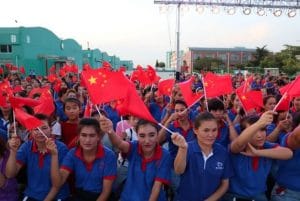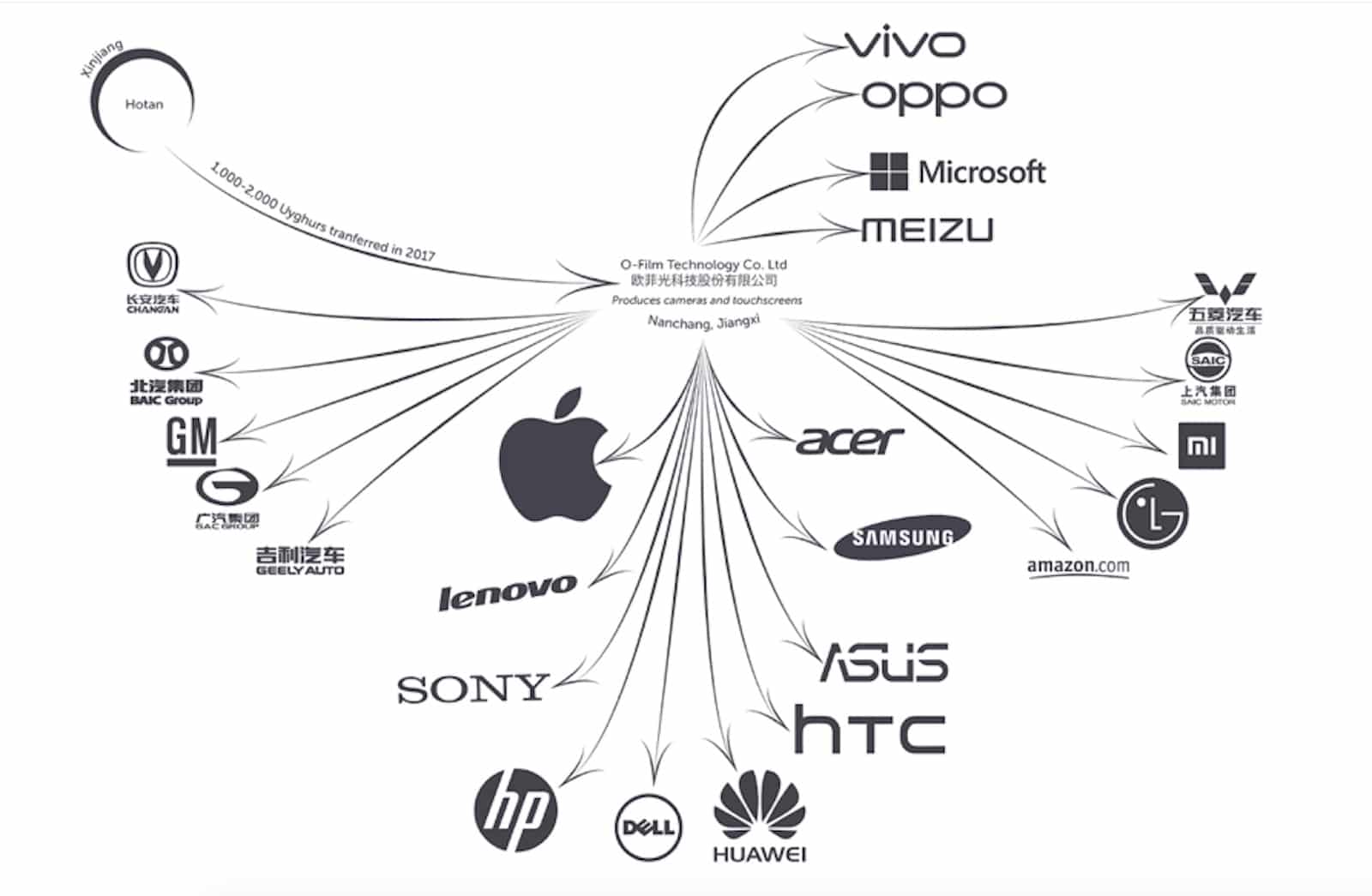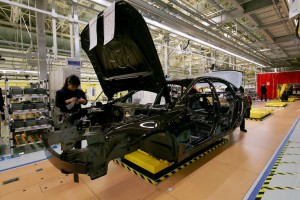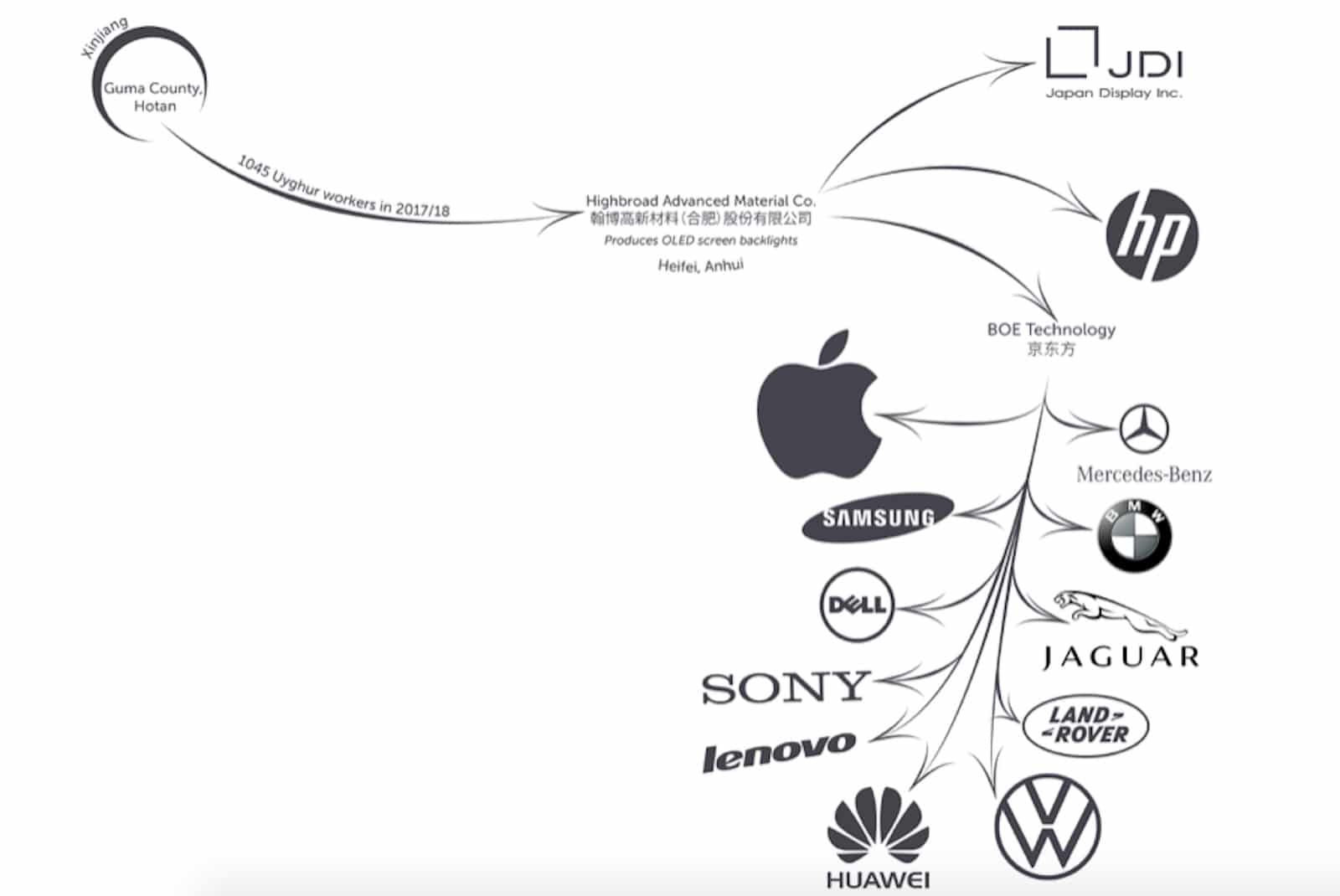
Uyghur workers waving the Chinese flag in October 2019. Uyghur are a Muslim minority in secular China.(Photo Credit: ASPI.)
General Motors, along with several other top automakers including BMW, Mercedes-Benz and Volkswagen, have been accused of using forced labor at factories in China by an Australian think tank.
The report from the Australian Strategic Policy Institute contradicts GM’s own recent statements that its practice support human rights.
The Australian report, however, states that the Chinese government “has facilitated the mass transfer of Uyghur and other ethnic minority citizens from the far west region of Xinjiang” to factories across the country.
(Hong Kong’s fate has China taking aim at Jaguar Land Rover.)
The report entitled “Uyghurs For Sale” said, “Under conditions that strongly suggest forced labor, Uyghurs are working in factories that are in the supply chains of at least 83 well-known global brands in the technology, clothing and automotive sectors.
Besides General Motors Co. and its principal automotive partner SAIC, a long list of companies with connections to the global automobile industry such as BMW, Bosch, BYD, Changan Auto, Geely, GAC Group, Google, Jaguar Land Rover, Mercedes-Benz and Volkswagen are also identified in the report on forced labor.
Other global companies, including Apple, Gap, Huawei, Nike, Samsung, Sony and North Face are also identified in the report, which estimates that more than 80,000 Uyghurs were transferred out of Xinjiang to work in factories across China between 2017 and 2019, and some of them were sent directly from detention camps.
“The estimated figure is conservative, and the actual figure is likely to be far higher. In factories far away from home, they typically live in segregated dormitories, undergo organized Mandarin and ideological training outside working hours, four are subject to constant surveillance, and are forbidden from participating in religious observances, the report noted.
Numerous sources, including government documents, show that transferred workers are assigned minders and have limited freedom of movement.
China has attracted international condemnation for its network of extrajudicial “re-education camps” in Xinjiang. This report exposes a new phase in China’s social re-engineering campaign targeting minority citizens, revealing new evidence that some factories across China are using forced Uyghur labor under a state-sponsored labor transfer scheme that is tainting the global supply chain.
(Ford rids luxury vehicle sales to Q2 sales jump in China.)
In all, ASPI’s research has identified 83 foreign and Chinese companies directly or indirectly benefiting from the use of Uyghur workers outside Xinjiang through potentially abusive labor transfer programs as recently as 2019, the report said.
In recent “Sustainability” report, General Motors said it is careful to police improper activity within its various supply chains.
“General Motors is committed to sustainable and responsible sourcing of goods and services throughout our supply chain. GM supports the human rights goals reflected in the adoption of conflict mineral due diligence requirements included in the Dodd-Frank Wall Street Reform and Consumer Protection Act of 2010. GM has a zero-tolerance policy against the use of child labor and prohibits abusive treatment to employees and corrupt business practices in our supply base,” the report said.
Uyghurs are a Muslim minority with deep roots in western China and, in the past, they have pushed for a measure of autonomy. The Peoples Republic of China, keenly aware of the anti-terror campaign in the U.S. and European Union, have identified the Uyghurs as potential terrorists.
The anti-Muslim language characteristic of Trump administration has prompted the Chinese government to intensify the efforts to pacify Xinjiang. The Chinese effort Xinjiang have intensified during Trump’s presidency with little in the way of protest from the U.S.
The Australian Strategic Policy Institute was formed in 2001 as an independent, non-partisan think tank. Its core aim is to provide the Australian Government with fresh ideas on Australia’s defense, security and strategic policy choices. ASPI is responsible for informing the public on a range of strategic issues, generating new thinking for government and harnessing strategic thinking internationally.
(GM’s second quarter sales in China fall despite strong market.)
ASPI’s International Cyber Policy Centre (ICPC) is a leading voice in global debates on cyber and emerging technologies and their impact on broader strategic policy. The ICPC informs public debate and supports sound public policy by producing original empirical research, bringing together researchers with diverse expertise, often working together in teams.



